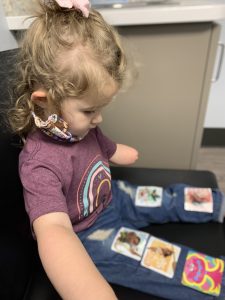Making medical decisions for a child can be overwhelming. Seven years into parenting and I still wonder sometimes if I’ve made the right choices for them. For example, “Do we move forward with braces for our 6-year-old or wait?” “Do we interrupt kindergarten for weekly physical therapy or try to address the issues at home after school?”
Parenting a child with a limb difference and a child with severe allergies has given me a little practice on how to make decisions regarding their health.
Uncertainty
As a “prepare for the worst case scenario” kind of mom, I desperately try to uncover what “could go wrong” for my child. A realist. That’s what I am. Before making a decision, knowing what COULD happen if we decide to move forward with medical care of any kind (such as therapies, ear tubes, orthotics, or even braces) brings me peace because I’m prepared for the worst. I don’t expect it, but am ready with a game plan. Knowing every “COULD” is not really possible, not only because children are unpredictable, but because their personalities, health needs, and their response to interventions vary. Not to mention each individual responds to various treatments, therapies, and medications differently.
In response to this uncertainty, I systematically uncover the most “what could happens” possible. My system: I ask questions.
Confidence in Inquiry
My husband and I ask and answer questions (informally) about our child and the intervention suggested by a doctor (or pursued by ourselves) to bring clarity and confidence. The questions can provide a starting point for deciding on elective types of interventions such as feeding tubes, prosthetics, or allergy therapies. “Is 3-6 years of allergy shots feasible for a 6-year-old?” “Can my 18-month-old effectively use a prosthetic?”
It is possible to feel peace about helping your child. You do the best you can, with the most information you can find. Maybe these questions can help you find peace and move forward to help your child.

1. What are the benefits for my child? Do the treatment side-effects (emotional, mental, social, physical) outweigh the benefits?
When I noticed my 2-year-old child had a wonky gait, we discovered he was dealing with low tone in foot/lower leg muscles. It was very clear that his ability to jump/run/skip would be affected long-term. The earlier we chose to intervene would result in better outcomes.
2. How long-term is the challenge my child is experiencing? Will treatment reduce the length of hardship or struggle?
When my oldest child developed a stutter at a young age, I wondered if he really needed speech therapy. Our very trusted pediatrician told us about speech therapy, but also recommended we wait because many kids grow out of it. After quite a few months, it wasn’t looking like he was going to. I didn’t want him to start school feeling like he couldn’t communicate.
Within a few months of therapy with a FABULOUS speech therapist, he was speaking fluently without a stutter.

3.Can the therapy or intervention be picked up later with the same benefit?
Our daughter could have a prosthetic right now, we just don’t think she actually needs, yet. We hope we aren’t doing her a disservice, but we don’t know for certain. The good news is that when she expresses a need/desire for a prosthetic later, we can pursue it then without it affecting her quality of life now.
She may have to work harder to learn how to use it, but that is an ok risk for us to take now.

4. How would the therapy or intervention affect my child’s quality of life?
A few months ago we were told that our 7-year-old will need braces. We decided to wait because he already is in a painful and sometimes distressing allergy therapy. He despises missing school for the appointments, so to add the dental appointments right now seems unfair. We decided to wait until summer so he doesn’t have to miss more class than he already does.
5. What kind of support will I need during and after treatment?
The support I have needed the MOST for ALL of the interventions we have chosen to pursue with each of our children has been childcare for my other two kids when I am whisking one off to an appointment or treatment. Most of their doctor and therapy appointments are scheduled during the workday and I rely heavily on my mother-in-law and mom for help. Thinking of all the logistics involved when implementing an adjustment to the family schedule is an important part of the decision-making process.
“Hard work” doesn’t quite encompass the mental fatigue that decision making can create when you have a child with extra needs. Hard truth though it may be, we rarely have a guaranteed, concrete answer as to how an intervention will impact our child. My experience is that therapies will cause anxiety and pain, but that they also improve my child’s quality of life. My hope is that the benefits my sons and daughter receive will out-weigh the difficulty that treatments may involve.
These questions, while not providing certainty, do provide possible outcomes for us to consider while making our decisions. Are there any additional questions you ask when in similar situations?















